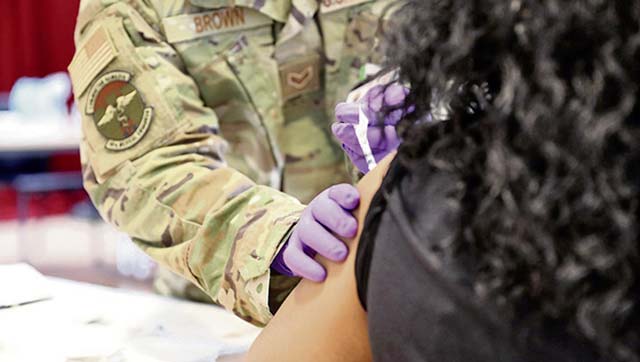
As families return from summer vacation and students return to school, the influenza (flu) season is approaching while the COVID-19 pandemic is still on-going.
According to the Centers for Disease Control and Prevention, every year in the United States, millions of children get sick with flu like illnesses and thousands of them are hospitalized due to complications from influenza viruses. Also, the risk of complications from the flu virus increases for those 65 years and older.
According to the World Health Organization, there are about 3 to 5 million cases of severe illness annually due to influenza viruses and about 290,000 to 650,000 deaths. While influenza and COVID-19 are both typically considered winter viruses, they can occur at any time.
“In other words, there is an increased risk of infection rate during the winter season compared to any other period in the year,” said U.S. Army Public Health nurse regional consultant Lt. Col. Simeon Smith. “During this winter season, we have to be vigilant to protect our families, friends, communities and ourselves from the spread of both influenza viruses and COVID-19.”
According to health experts, influenza viruses and COVID-19 are both contagious respiratory illnesses and can affect the upper airway and sometimes the lungs.
“Without being protected by the influenza and COVID vaccines, no one is immune from these viruses,” added Smith.
Health officials warn that being infected with one, or both, of these viruses can cause mild to severe illnesses and could lead to death.
According to Smith, both of these viruses have similar symptoms, and it can be difficult to tell the difference just by looking at or experiencing the symptoms. Smith recommends to consult with a healthcare provider and get tested when you feel sick or display symptoms.
“As we enter into the winter season, it is increasingly important to take the necessary precautions to protect ourselves against influenza viruses and COVID-19,” said Smith.
The Food and Drug Administration recently approved COVID-19 vaccine for those who are six months old and above. Studies show that since the development and implementation of the COVID-19 vaccine, there has been a sharp decline in the death rate and hospitalization in the United States and Europe.
According to Smith, the influenza vaccine is an approved seasonal vaccine that is administered every year. TRICARE beneficiaries can contact their military hospital or clinic in order to receive the vaccines.
“There are things we all can do in protecting our family, friends, our communities and ourselves,” said Smith.
Smith offered the following recommended preventive measures to protect families, friends and ourselves:
- Get vaccinated. Vaccines save lives.
- Stay home when you are not feeling well; do not send your child to school or daycare when he or she is feeling sick, consult with your healthcare provider.
- Wash your hands regularly with soap and water; if water is not available, use alcohol based hand sanitizer.
- Clean and disinfect surfaces and objects that may be contaminated with these viruses.
- Cover your nose and mouth with tissue or the inside of your elbow when you cough or sneeze.
- Limit your contact with others when you are sick and avoid close contact with people who are sick.
- When possible, have more outdoor activities instead of indoor activities.
“We all have a role to play in protecting ourselves and love ones and limiting the spread of viruses within our schools, work environments and communities,” added Smith.
CDC’s Advisory Committee on Immunization Practices recommends that individuals should get vaccinated because it is the best protection against the influenza and COVID-19 viruses.
Individuals are encouraged to contact their local military hospital or clinic and arrange to get their flu and COVID-19 vaccines.


